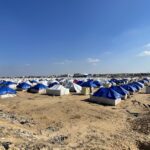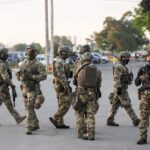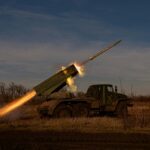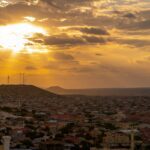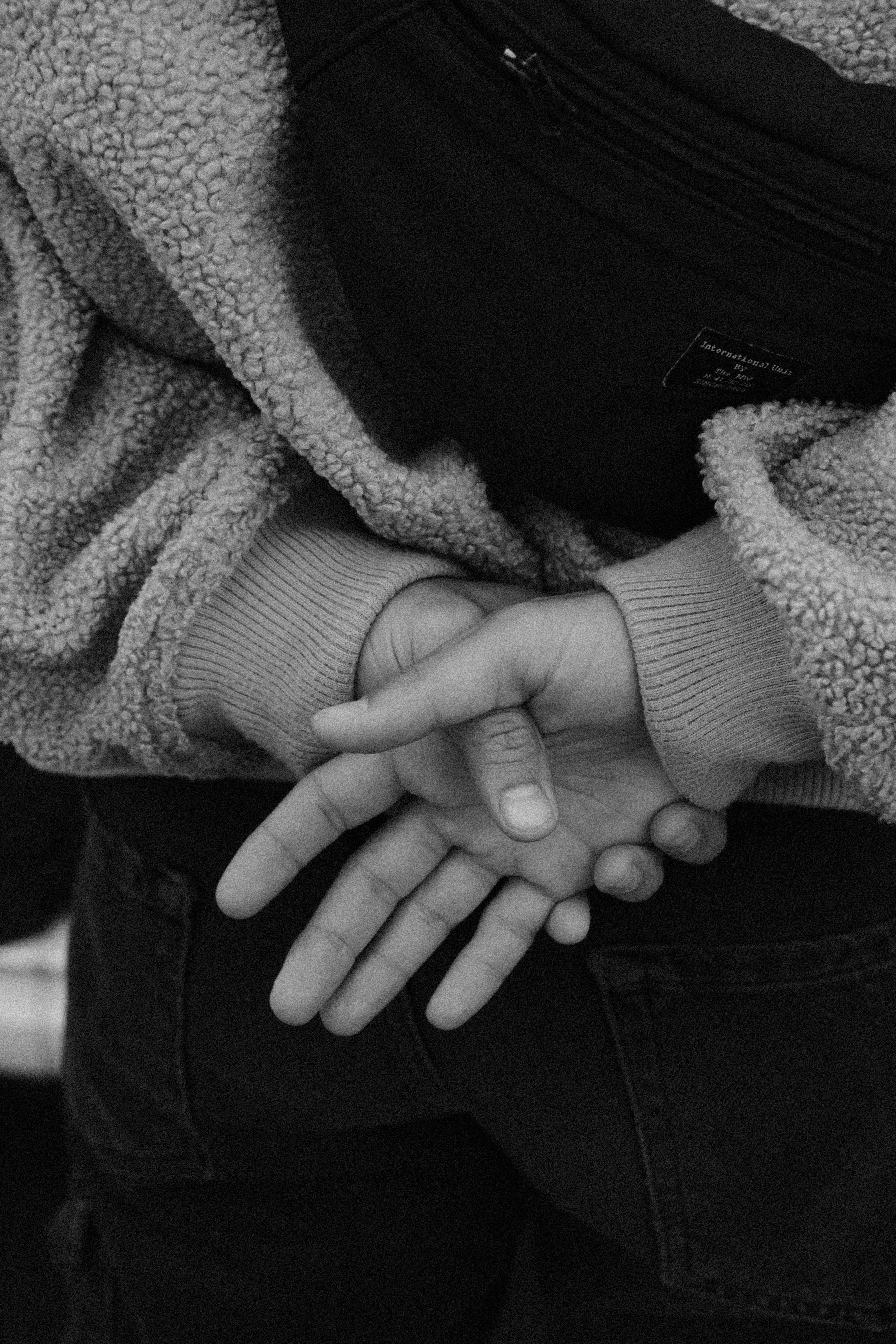In the ruins of Shuja’iyya, a neighborhood in eastern Gaza City that has faced Israeli bombardment during the ongoing war on the Strip, Samir Ferwana still remembers his daughter’s laughter.
Ferwana married Saja al-Ghamri, 20, in 2022. “Those were the sweetest days of my life,” he says of their simple wedding. When their first and only daughter, Sila, was born in January 2023, it felt like the universe had smiled down on them. “The day Sila was born, the whole house lit up,” Samir recalls. “She was the fruit of our home. Everyone celebrated her arrival. I handed out sweets to the neighbors, and a few days later, we held a gathering to give thanks.”
Sila’s tiny hands gripped the fingers that reached for her. Her smile, mischievous and bold, bit harmlessly at any hand that dared come close. In November 2023, during the week-long fragile truce, Samir held her tightly and marveled at the small white bud of a tooth pushing through her gums. She seemed alive with a brightness that no war could dim.
Until it did.
On December 5, 2023, before dawn, strange noises crept around their house. Randa, Samir’s mother, woke her husband. As he peered out the window, two explosions split the air. Smoke swallowed the streets. They knew the army was near.
Samir moved quickly, cradling Sila against his chest, shielding her tiny body with his own. “She was in my arms,” he says, voice trembling. “The shrapnel was flying around us.”
He took a hit—a shard tearing through his shoulder and neck. But Sila, when he wiped the dust from her face, looked up and—miraculously—smiled. “There was no blood,” he says. “I thought she was fine. I thanked God.”
They ran.
Amid the roar of shells and the rattle of drone fire, the family tried to flee. Ten meters. White flags raised. No safety. A missile chased them, ripped through the air, and slammed into the earth at their feet.
Samir stumbled, grabbed his bleeding siblings, and found cover in a stranger’s house. It was only then that he could examine his daughter.
Sila was hurt. Badly.
“What I didn’t know,” Samir says, “was that a small piece of shrapnel had pierced her tiny belly. She was bleeding inside.” Desperately, he tried to find help. Sprinting wounded through shattered streets, searching for an ambulance, a miracle, anything. But northern Gaza had run dry of mercy. “Thousands were wounded, but ambulances couldn’t reach us.”
Sila lay bleeding for twelve long hours.
Inside the house, wrapped in her mother Saja’s arms, she fought to stay alive. Samir clutched his phone, pleading with the Red Cross. “I need an ambulance for my sister’s children. They’re wounded, trapped,” he told the operator.
“We’re sorry,” came the reply. “The army won’t allow our teams into Shuja’iyya.”
Samir remembers the moment when Sila died. “It was like a lightning bolt,” he says. “I sat there for an hour, not understanding, refusing to believe.”When he finally carried her, her little face was still, peaceful, smiling as if dreaming. “There wasn’t a drop of blood on her face. She looked like a sleeping angel.”
That night, he saw his wife crumble. Saja didn’t scream. She didn’t weep. She stared endlessly into places no one else could see. “I wished she would just cry,” Samir says, “so I could know she was still with me.” He tried everything. Gathered loved ones around her. Pulled warmth into the coldest corners of their broken world. “I wanted her to feel alive again,” he says. Her silence felt heavier than a scream. Saja held Sila’s body in her arms for a full day. Not even the neighbor’s wife could convince her to let go. “Please,” Saja pleaded, clutching her lifeless child tighter. “Let her stay with me a little longer.”
She had married young, given birth young, and now, before even turning 21, carried the unfathomable grief of witnessing the death of her only child.
Four miscarriages followed before a glimmer of hope began to flicker. In March, Saja gave birth again to a daughter. They named her Aya, their new only child. “I felt like God rewarded our patience by filling our hearts with hope again,” Samir says. “When Aya was born, it felt like life laughed with us for the first time in a long while.”
But scars remain.
“I want to shield my wife and daughter from everything now,” he says. “I’m terrified of any harm coming near them.”
Even as he celebrates Aya’s fragile new life, other worries gnaw at him: food, nutrition, survival. “I struggle to provide healthy food for Saja, especially while she’s breastfeeding. Relying on supplements isn’t enough.”
*
According to the United Nations, more than 14,000 children have been killed in Gaza since October 2023. Thousands more have been orphaned, their lives cleaved into “before” and “after” by bombs that make no distinction between militants and babies. In a place where almost every home mourns a missing child, survival itself has become a form of resistance.
In the narrow alleys of Gaza’s Beach Camp, on Oct. 4, 2023, just three days before the war, Nesreen came into the world. Her mother, Yusra Saadat, 24, remembers the first cries of her tiny, soft, and radiant baby as if it were yesterday.
“She needed me for everything,” Yusra says, her voice trembling. But the war would starve Gaza of everything children need: food, safety, medicine, even milk. Yusra tried to stay strong, but postpartum depression, hunger, and grief gnawed at her. “Because of the shortages and sadness from losing loved ones, I couldn’t even feed her properly,” she recalls.
Each night, the bombs drew closer. Once, an entire neighborhood beside them was wiped out. Ashes replaced homes. The scent of gunpowder clung to everything. Fear clawed at Yusra’s chest every time the ground shook.
It became clear that they had to leave.
On Nov. 7, 2023, at sunrise, she wrapped little Nesreen tightly against her chest. She carried nothing but a small bag of the baby’s clothes — no belongings for herself. The air was thick with smoke; the roads were littered with debris and death. “I walked five hours,” she says. “At one moment, my foot stepped on a corpse. I screamed and cried so much that my body shook.”
The heat was merciless. As they fled, Nesreen’s tiny face flushed red with fever. She began to cry from hunger, her cries growing fainter under the burning sun. Desperate, Yusra mixed a bottle of cold milk. “It broke my heart to see her like that,” she says. “She fainted in my arms. I kept whispering to her, ‘Wake up, my love. We’re almost there.'”
Hours later, Nesreen stirred. They had made it to the house of distant relatives in Deir al-Balah. The apartment was already overcrowded. Yusra, her husband Mohammad Al-Najjar, 29, and Nesreen shared a single room with dozens of others.
On Nov. 22, 2023, at 2 a.m., Israeli warplanes bombed their building. Five floors collapsed onto seventy people sheltering inside. Yusra remembers the world flipping upside down. “I was thrown into the air. Buried under layers of concrete.”
A wall pinned her head; a cement column crushed her left side. For over an hour, she lay trapped beneath the wreckage, barely able to breathe. Above her, the bodies of others weighed down the rubble. Finally, rescuers from the Civil Defense managed to pull her free and rushed her to Deir al-Balah Hospital.
It was there, in the cold sterility of the emergency ward, that her husband found her. Mohammad wept as he cradled her broken body. “Where is Nesreen?” he cried.
Yusra blinked, dazed. “I don’t know,” she said, “Ask your brothers.”
Maybe some of us survived that night, but inside, we are all dead people walking.
Yusra Saadat
Mohammad searched desperately. At first, a child’s body was found at the hospital’s mortuary, wearing clothes similar to Nesreen’s. But the face was covered, the features unrecognisable. “It wasn’t her,” he whispered.
He returned to the rubble and found Nesreen’s small crib crushed. Her body was finally found, buried beneath a heavy concrete pillar. Her face, once so full of life, was shattered beyond recognition. “Mohammed was in utter disbelief,” Yusra murmured, “His beautiful daughter’s face is smashed to the ground.”
At the hospital, Yusra pleaded to see her baby. She still clung to the hope that Nesreen was alive. Mohammad couldn’t tell her — not yet. He lied gently, telling her, “She’s in the incubator. You’ll see her tomorrow.”
But Yusra’s body already knew.
In the morning, Yusra asked to see her baby, as promised. Mohammad sat beside her bed. His hands trembled. Then he spoke the words that weighed heavier than the rubble that had crushed their home: “Say: ‘Nothing will happen to us except what God has decreed. He is our protector. And in God let the believers put their trust.'”
Yusra stared at him, not understanding. “What are you saying?” she asked.
He choked back a sob. “Oh Lord, reward us in our calamity and compensate us with something better.”
The world spun. Her chest tightened. “Nesreen is dead?” she screamed.
“Maybe some of us survived that night,” Yusra says as she recalls the loss, “but inside, we are all dead people walking.”
*
In a dim, crumbling apartment in Khan Younis, where the plaster peels from the walls and the hum of generators fills the air, Nevin Shuhada sits folded into herself on a thin mattress. Her hands twist around the edge of her dress, not out of habit, but to keep from unraveling. The room is heavy with silence. In the corner, a crib stands untouched, its sheets still creased from the last nap Nevin’s baby took. He had only just begun to crawl. His fingers gripped the edges of furniture as he chased his sisters’ footsteps. His laughter, soft, bright, and determined, used to echo through the narrow space. A few wobbly steps, a small bowl of rice and milk, a kiss to his mother’s cheek. Then came the blast.
Nevin had waited almost twenty years for him. After 19 years of failed IVF cycles, thousands of dollars, and over 700 injections, Kenan had finally come to them like dawn after a long storm. Her first son, Hikmat, had been born with a severe heart condition that made him disabled. They loved him completely, but they longed for a sibling, someone to stand by him. “I used to pray every day that God would give me a healthy baby, whether boy or girl, someone who could be a support to my eldest son, Hikmat.”
She tried everything. “I tried scientific methods—alkaline and acidic foods, then fertility injections, and finally IVF. We did the IVF after three months of preparation. It cost nearly $4,000, but God didn’t will it to succeed.” Then came three pregnancies. Three silent endings. “I got pregnant three times naturally, and every time the pregnancy ended early.”
When she was pregnant with Kenan, doctors told her she had a blood clotting issue. She started taking twice-daily Heparin injections and followed strict bed rest. “I couldn’t even go to the bathroom. I felt a terrible heaviness every time I stood up.”
Still, she held on. Even though she bled from month five to eight, somehow, the pregnancy lasted. And then he was here. “The joy of his birth was indescribable. It revived my heart, my eyes, and my soul. I saw in Kenan a companion for Hikmat.”
She tested everything. “I did every possible test to make sure he was a healthy baby.” She swaddled him with a tenderness shaped by grief, tucked him into a world she tried to make safe. “God gave me the strength to carry him. Now I ask for the strength to carry this pain.”
But in Gaza, even miracles are borrowed.
On Dec. 9, 2023, their home in Rafah was struck. “Kenan was small and nursing in my arms. I hugged him tightly, held him with all my strength, and somehow we got out from under the rubble.”
They moved again. Then again. In April 2025, the family rented a modest ground-floor apartment in Khan Younis. It had four stories above it. It wasn’t safe. But nowhere was. “When the war resumed after the ceasefire, the shelling was intense. We all gathered by the apartment entrance,” Nevin said.
That night, Kenan wouldn’t sleep. He bounced between laps and the tiled floor, chasing shadows. “He was nursing and playing next to me. Between us was a glass dish with rice and milk. He kissed me and smiled into my eyes. Then he took two small steps—just two—before the explosion.”
The lights went out. The walls cracked. Dust filled their lungs. “We were thrown from our places. Everything went dark.” Nevin crawled through smoke and rubble, calling his name. “I kept calling out, ‘Kenan, are you here? I hear your voice!’”
A neighbor’s flashlight pierced the debris. “We pulled Kenan out from beneath a concrete belt. He was crying. I had a bit of hope that he would live.” At the hospital, the hope faded. “Every time I asked about him, they said the situation was getting worse.”
And then at 2:30 a.m., she felt the shift. “I felt something leave me… it shook my entire body. I told myself, ‘Kenan is gone.’”
The doctor confirmed what her heart already knew.
She didn’t scream. She prayed. “Praise be to God. Oh Allah, reward me in my misfortune and grant me something better. May God have mercy on you, Kenan. May He give us patience.” She folded his blanket and placed it in a drawer. Slowly. As if tucking him in one last time.
“He wasn’t just a baby,” she said. “He was everything we had worked so hard for. And now he’s gone.” She had waited two decades to hear him laugh. Now she is left with silence.



